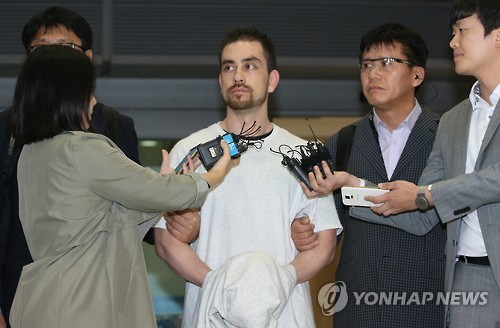American Charged in 1997 South Korea Murder Pleads Not Guilty
Source: Reuters
American Charged in 1997 South Korea Murder Pleads Not Guilty
World | Reuters | Updated: October 08, 2015 12:35 IST
Seoul: An American accused of murdering a South Korean college student in the bathroom of a Seoul Burger King 18 years ago pleaded not guilty today after his extradition from the United States last month.
The 1997 murder of Cho Joong-pil, 22, in the Itaewon nightlife district, which is popular with expatriates in the South Korean capital, fuelled discontent among Koreans against US military bases in the country.
Korean officials say Arthur John Patterson, whose father was a civilian contractor to the US military, fled to the United States after Cho was found dead on the floor of the restaurant bathroom. Cho had multiple stab wounds to his neck and body.
Patterson's friend, Edward Lee, also a US citizen, was initially sentenced to life in prison for the murder but was later acquitted on appeal due to lack of evidence.
Read more: http://www.ndtv.com/world-news/american-charged-in-1997-south-korea-murder-pleads-not-guilty-1229682
[center]

Arthur John Patterson

Demonstration in Korea[/center]
Old article, when the defendant was staying in the States:
South Korea Reopens the Burger King Murder File
By Geoffrey Cain / Seoul Wednesday, Jan. 20, 2010
It is one of South Korea's most famous cold-case files, a sensational murder that drummed up sentiment against U.S. military bases in the country for nearly a decade. On April 3, 1997, a South Korean university student, Cho Chong Pil, 22, was found dead on the bathroom floor of a Burger King restaurant in Itaewon, a nightlife district popular among foreigners in central Seoul. He had been stabbed several times in the neck in what prosecutors later called a random "American gang-style" killing. After several days, they named two suspects who had dined together at the fast-food restaurant that evening: Arthur Patterson, the 17-year-old son of a U.S. Army contractor, and 18-year-old Korean American Edward Lee. Both admitted to witnessing the murder, and both accused each other of doing it.
It's been over 10 years since the crime went to trial, and both suspects, after serving some prison time, are free. Now, the Burger King murder is back. Last month, prosecutors reopened the case after the unresolved crime got a wave of attention from a South Korean film and several television series this fall. Critics have long said the trial was bungled, claiming that a 1966 bilateral treaty (SOFA), which outlines the legal rights and responsibilities of U.S. soldiers in South Korea, hinders investigations into crimes committed by American servicemen and their families in South Korea. In 1998, the court dropped charges against Patterson, handing him an 18-month prison sentence for possessing an illegal weapon and destroying evidence, from which he was released early in 1999 as part of a widespread amnesty the government granted to 2000 convicts. The court found Lee guilty of murder, sentencing him to life in prison but later reduced the sentence to 20 years. In 1999, he was fully acquitted by the Supreme Court on a lack of evidence.
The murder of Cho remains a mystery, a fact that has infuriated South Korean activists who made the crime a cause célèbre in their fight against the U.S. military presence in their country. After authorities promised to pursue Patterson's case further in 1998, a prosecutor mistakenly failed to renew a travel ban on him. Patterson returned to California in 1999, where he remains today. (Lee, after being acquitted, also returned to the U.S.) In 2006, a Seoul court ordered the government to award $34,000 to the victim's family. The case remained officially closed until December, and on Jan. 5 the Ministry of Foreign Affairs announced it had sent documents requesting the extradition of Patterson from his home in Sunnyvale, Calif. If the U.S. government cooperates, they say, Patterson will be returned to Seoul to face a new trial — and possibly more severe charges.
The government's move follows a flurry of renewed interest in the crime in popular culture. In September, a blockbuster film that dramatized the murder, The Case of the Itaewon Homicide, swept South Korea. That same month, a South Korean television crew discovered Patterson was living in Sunnyvale after the U.S. government failed to locate him following a 2005 request for judicial assistance from Seoul. "After we concluded that [the television crew's] finding was true, we decided to reopen the case," says Oh Se In, a Seoul city prosecutor acting as a spokesman for the case. Lee, the other defendant in the trial who has always maintained his innocence, says he welcomes the decision. "If the U.S. government hands Patterson over and the prosecution reinvestigates, I will actively cooperate," he told Dong-A Ilbo, a Korean-language newspaper in Seoul, last month.
More:
http://content.time.com/time/world/article/0,8599,1954633,00.html